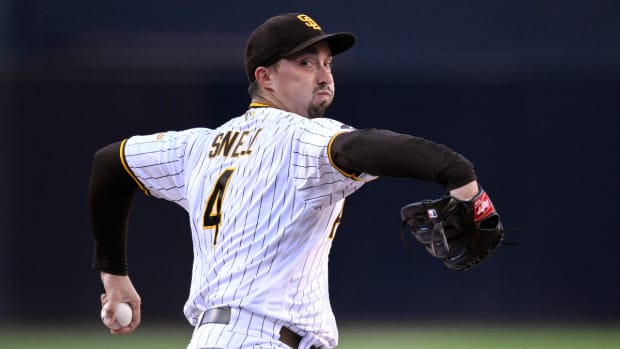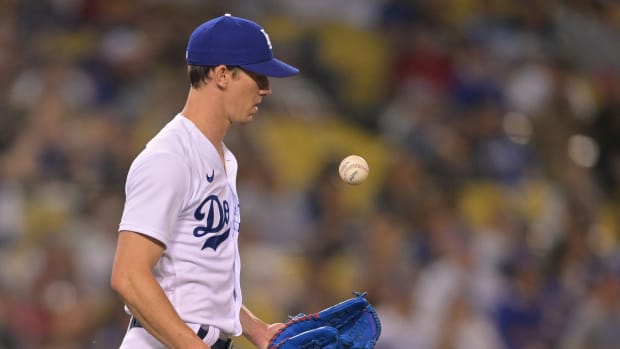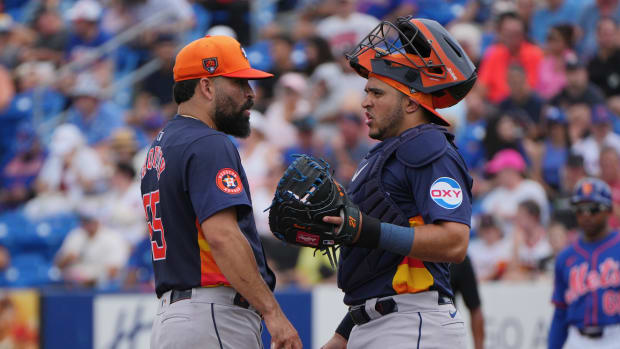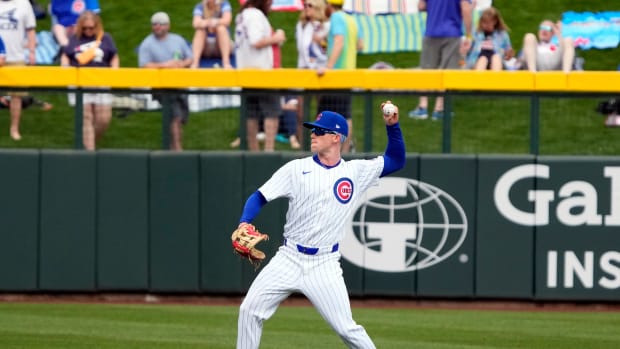
Anniversary of the ultimate slugfest and two milestone hits
Pete Rose (left) and Mike Schmidt combined for five hits, seven runs scored and eight RBIs in the memorable game at Wrigley Field. (AP)
David Wells’ perfect game isn’t the only memorable milestone with a May 17 anniversary. The annals of baseball history feature not one but two Hall of Famers collecting their 3,000th hits, 45 years apart on this day, as well as the highest-scoring game since 1922.
That game, which took place on May 17, 1979, saw the Phillies beat the Cubs, 23-22 at Wrigley Field, thus exacting a modicum of revenge for the Cubs' Aug. 25, 1922 26-23 win at Wrigley, the highest-scoring game in major league history. Retrosheet doesn't record the wind speed or direction in the former, but for both that game and the latter — "18 mph in unknown direction" — it's safe to assume it was blowing out.
In the 1979 game, the two teams combined for 11 homers, three by the Cubs' Dave Kingman, one apiece by teammates Bill Buckner, Jerry Martin and Steve Ontiveros, two by the Phillies' Mike Schmidt, and one apiece by Bob Boone, Garry Maddox and starting pitcher Randy Lerch. Schmidt and Boone both hit three-run homers off Cubs starter Dennis Lamp in the first inning, chasing him after he allowed six runs while retiring just one hitter. Facing reliever Donnie Moore, Lerch hit a two-out solo homer to run the score to 7-0 before he'd even taken the mound
Sometime during that rally, Phillies broadcaster Richie Asburn, who played for both teams in his career, and thus knew the Wrigley winds well, told listeners, "I have a feeling this might wind up about 19-12."
Once on the mound, Lerch fared about as well as his counterpart. He allowed singles to the first three hitters, with Buckner's hit bringing in two runs, and then Kingman's three-run homer cutting the score to 7-4. He got just one out before departing following Martin's double. Reliever Doug Bird allowed two more runs before the inning was out, so the score was 7-6 after one full inning. Neither team scored in the second, but then the Phillies erupted for eight runs in the third, capped by Maddox's three-run homer off Willie Hernandez; the centerfielder had led off the inning with a double. The Phils extended their lead to 17-6 the following inning with RBI doubles by Maddox and Pete Rose.
It wasn't over, even when the Phillies answered fourth-inning solo homers by Kingman and Ontiveros with a four-run fifth against Hernandez to take a 21-9 lead. The Cubs plated seven in the bottom of the fifth against Tug McGraw via a grand slam by Buckner and a three-run homer by Martin, trimming the score to 21-16. After holding the Phillies scoreless in the sixth, the Cubs closed the gap to 21-19 via a three-run sixth that included another solo shot by Kingman.
Like two exhausted heavyweights in the late rounds, both teams slowed down the returns of their punches. The Phillies scored one in the top of the seventh, and the Cubs didn't respond until tying the game at 22-22 in the eighth with five singles against Rick Reed. The game stayed knotted through the ninth inning, but Schmidt's 10th inning solo homer off Bruce Sutter — a battle between two future Hall of Famers — produced the margin of victory.
In all, the 4-hour, 3-minute game featured 45 runs and 50 hits, 23 of which were for extra bases — producing a record 97 total bases. Larry Bowa was the only player to collect five hits, two of which were doubles, and he was one of four players, along with Rose, Kingman and the Cubs' Ivan de Jesus, to score four runs. Buckner drove in a game-high seven runs, Kingman added six, Boone five, and Maddox, Schmidt and Rose four apiece. The Phillies used five pitchers, the only one of whom didn't allow at least four runs was Rawly Eastwick, who pitched two scoreless innings for the win. McGraw allowed a team-high seven runs (four earned) while getting just two outs. Of the six Cubs pitchers, Lamp, Moore and Hernandez all allowed at least six runs, with the latter yielding a team-high eight (six earned) as well as seven walks (four of which were intentional) in 2 2/3 innings. The only Cubs pitcher not to allow a run was Ray Burris, who did so in 1 2/3 innings.
Managed by Danny Ozark, the Phillies were an NL powerhouse at the time of the game; they had won three straight NL East titles and came in with the majors' best record at 23-10. The Cubs, under Herman Franks, were just 16-15 at the time. The two teams wound up close in the NL East standings, with Philadelphia playing sub-.500 ball the rest of the way to finish in fourth place at 84-78, four games ahead of the 80-82 Cubs.
As for the 3,000th hits, on this date in 1925, Tris Speaker became just the fifth player in major league history — after Cap Anson, Honus Wagner, Nap Lajoie and Ty Cobb — to reach that plateau. Playing for the Indians as a 37-year-old, he collected three hits off the Senators' Tom Zachary, the third of which gave him the milestone. Speaker would go on to lead the AL in on-base percentage that year while batting a sizzling .389/.479/.578 with 12 homers and an amazing 12/70 strikeout-to-walk ratio in 518 plate appearances. He played three more seasons and ran his hit total to 3,514, which still ranks fifth all-time; his 792 doubles rank first. Speaker was voted into the Hall of Fame in 1937, the second year in which players were inducted.



































